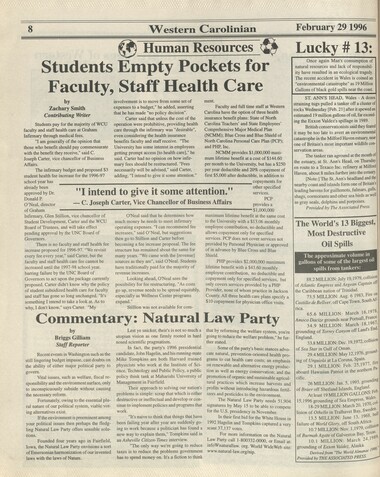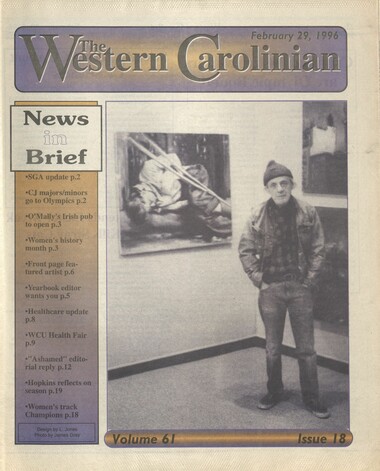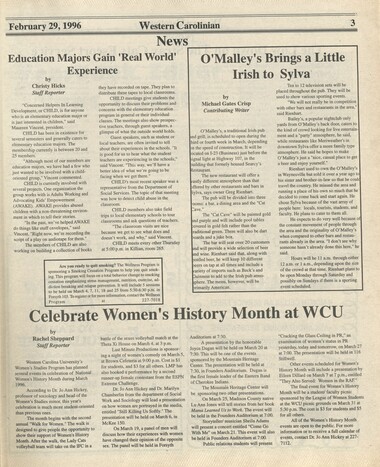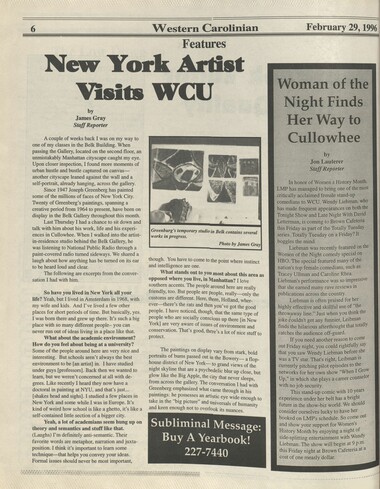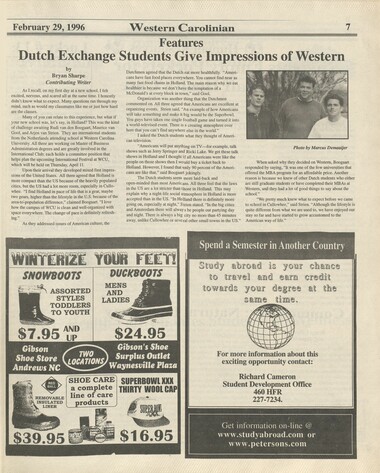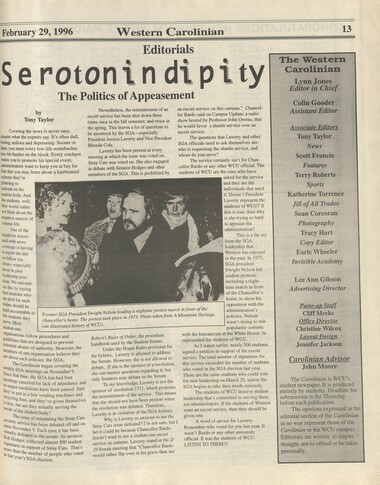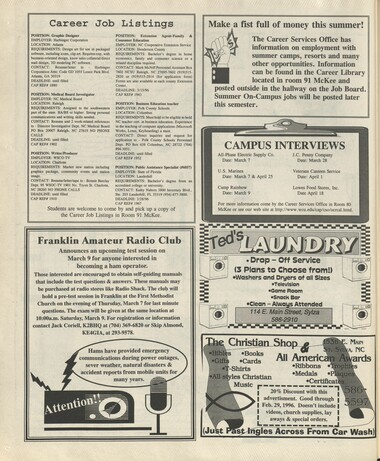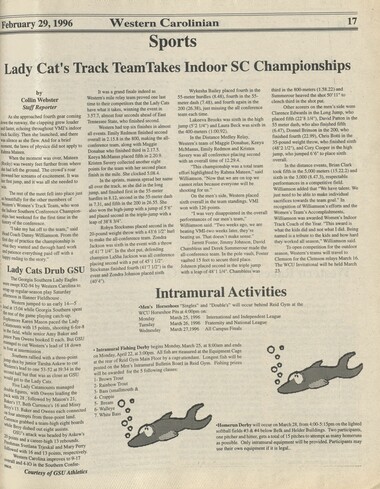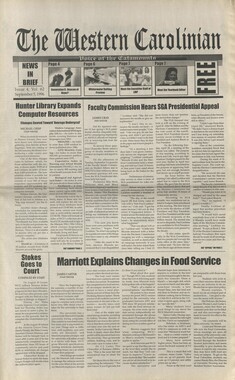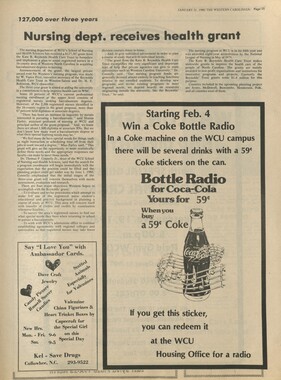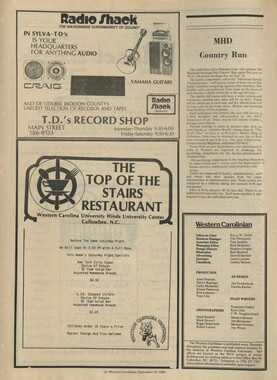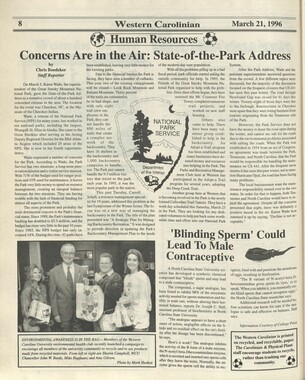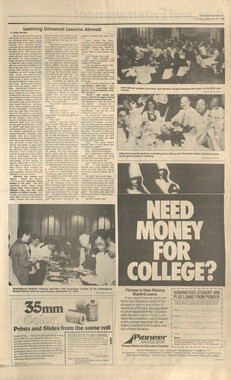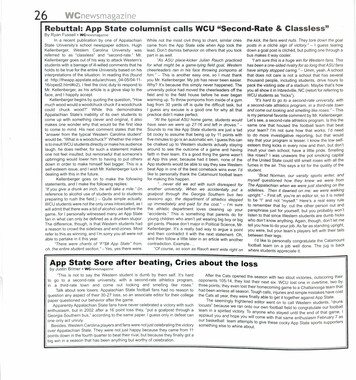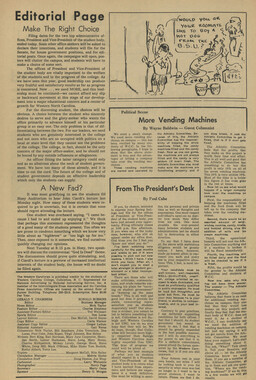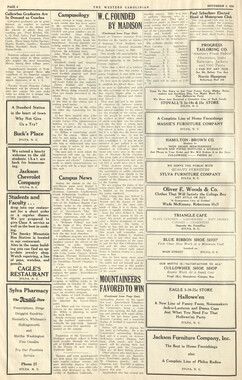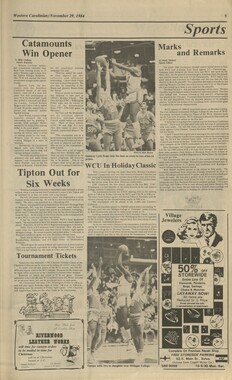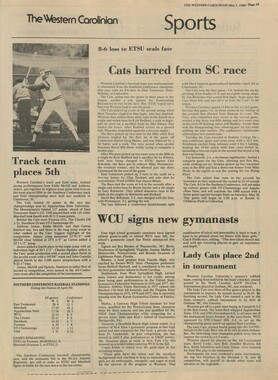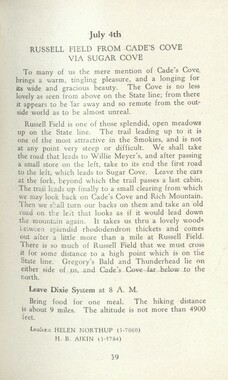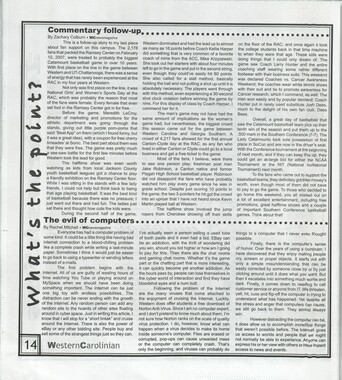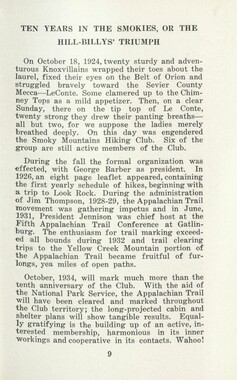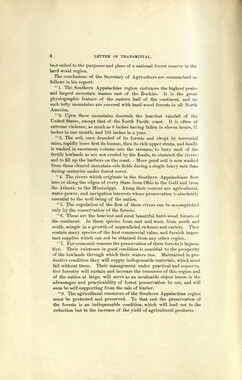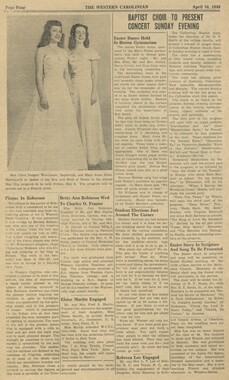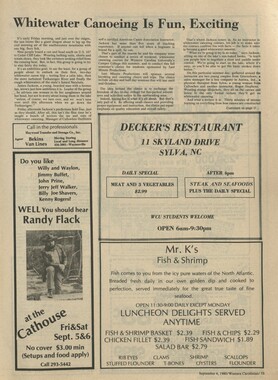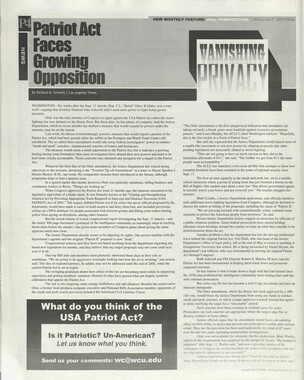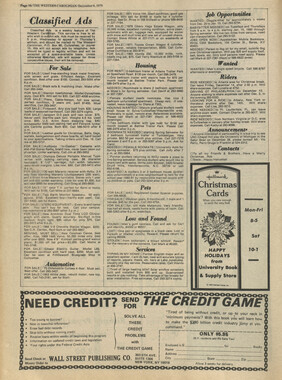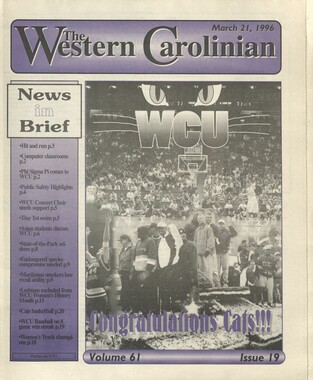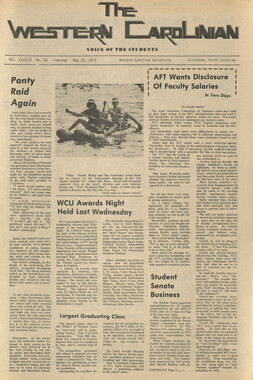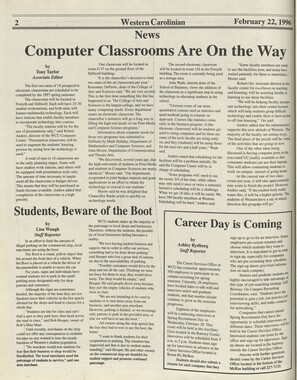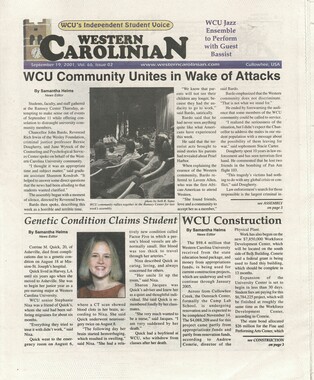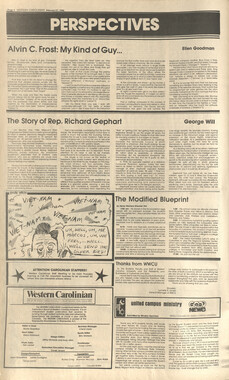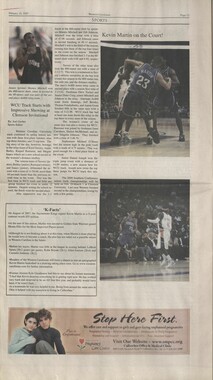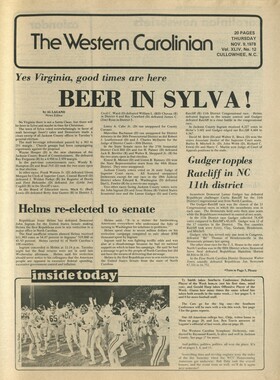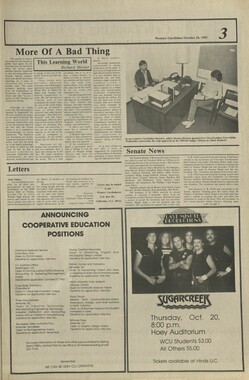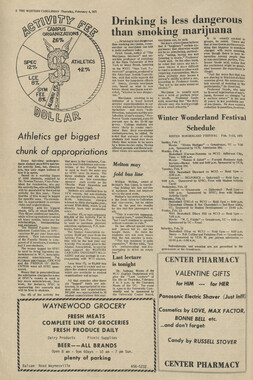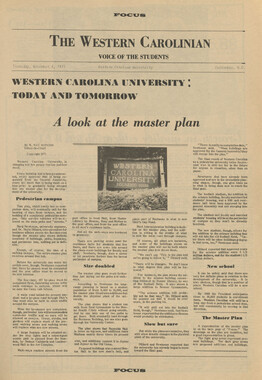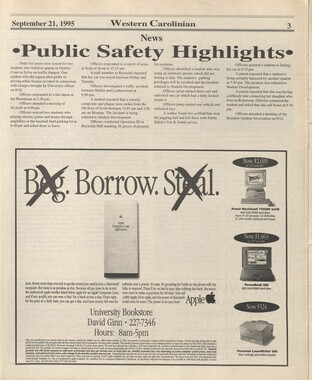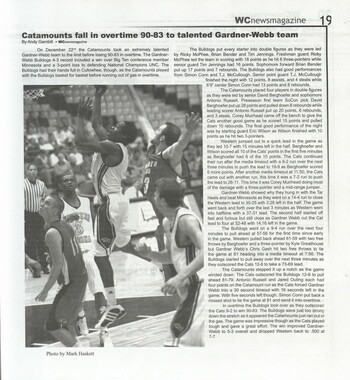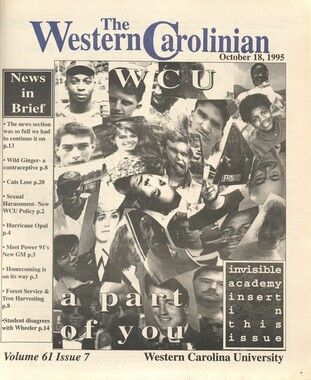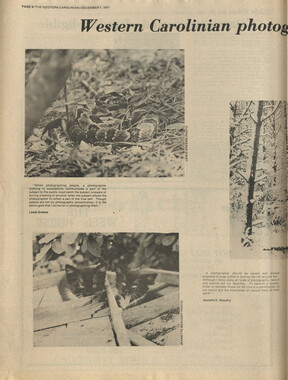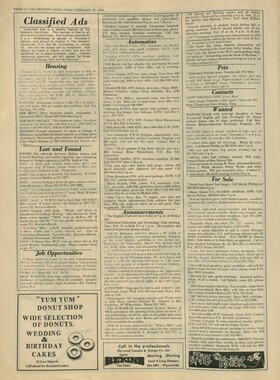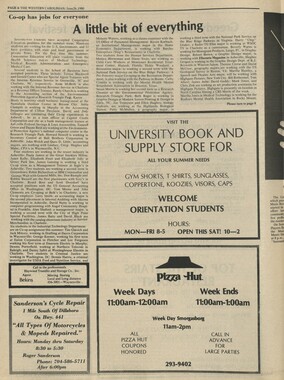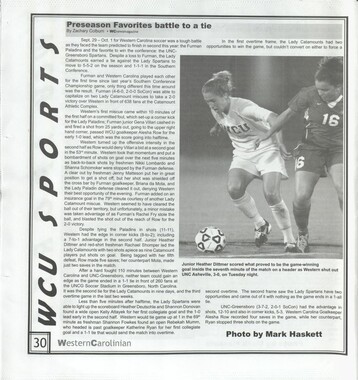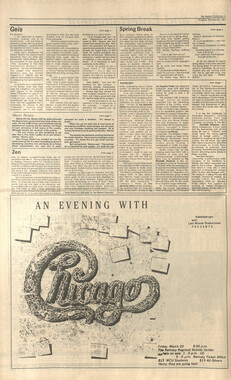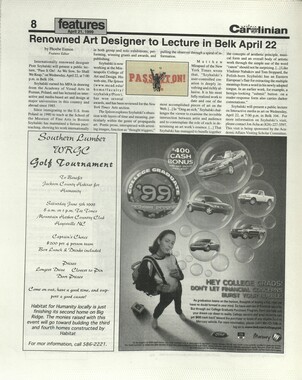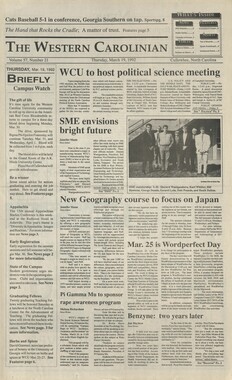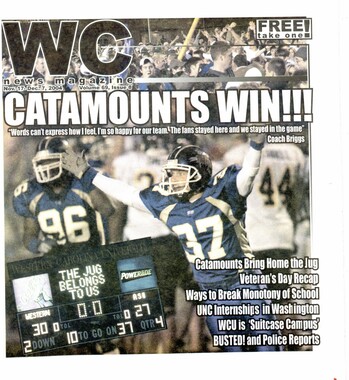Western Carolina University (21)
View all
- Canton Champion Fibre Company (2308)
- Cherokee Traditions (291)
- Civil War in Southern Appalachia (165)
- Craft Revival (1942)
- George Masa Collection (137)
- Great Smoky Mountains - A Park for America (3080)
- Highlights from Western Carolina University (422)
- Horace Kephart (973)
- Journeys Through Jackson (159)
- LGBTQIA+ Archive of Jackson County (89)
- Oral Histories of Western North Carolina (318)
- Picturing Appalachia (6617)
- Stories of Mountain Folk (413)
- Travel Western North Carolina (153)
- Western Carolina University Fine Art Museum Vitreograph Collection (129)
- Western Carolina University Herbarium (92)
- Western Carolina University: Making Memories (738)
- Western Carolina University Publications (2491)
- Western Carolina University Restricted Electronic Theses and Dissertations (146)
- Western North Carolina Regional Maps (71)
- World War II in Southern Appalachia (131)
University of North Carolina Asheville (6)
View all
- Allanstand Cottage Industries (62)
- Appalachian National Park Association (53)
- Bennett, Kelly, 1890-1974 (1463)
- Berry, Walter (76)
- Brasstown Carvers (40)
- Carver, George Washington, 1864?-1943 (26)
- Cathey, Joseph, 1803-1874 (1)
- Champion Fibre Company (233)
- Champion Paper and Fibre Company (297)
- Cherokee Indian Fair Association (16)
- Cherokee Language Program (22)
- Crowe, Amanda (40)
- Edmonston, Thomas Benton, 1842-1907 (7)
- Ensley, A. L. (Abraham Lincoln), 1865-1948 (275)
- Fromer, Irving Rhodes, 1913-1994 (70)
- George Butz (BFS 1907) (46)
- Goodrich, Frances Louisa (120)
- Grant, George Alexander, 1891-1964 (96)
- Heard, Marian Gladys (60)
- Kephart, Calvin, 1883-1969 (15)
- Kephart, Horace, 1862-1931 (313)
- Kephart, Laura, 1862-1954 (67)
- Laney, Gideon Thomas, 1889-1976 (439)
- Masa, George, 1881-1933 (61)
- McElhinney, William Julian, 1896-1953 (44)
- Niggli, Josephina, 1910-1983 (10)
- North Carolina Park Commission (105)
- Osborne, Kezia Stradley (9)
- Owens, Samuel Robert, 1918-1995 (11)
- Penland Weavers and Potters (36)
- Roberts, Vivienne (15)
- Roth, Albert, 1890-1974 (142)
- Schenck, Carl Alwin, 1868-1955 (1)
- Sherrill's Photography Studio (2565)
- Southern Highland Handicraft Guild (127)
- Southern Highlanders, Inc. (71)
- Stalcup, Jesse Bryson (46)
- Stearns, I. K. (213)
- Thompson, James Edward, 1880-1976 (226)
- United States. Indian Arts and Crafts Board (130)
- USFS (683)
- Vance, Zebulon Baird, 1830-1894 (1)
- Weaver, Zebulon, 1872-1948 (58)
- Western Carolina College (230)
- Western Carolina Teachers College (282)
- Western Carolina University (2008)
- Western Carolina University. Mountain Heritage Center (18)
- Whitman, Walt, 1819-1892 (10)
- Wilburn, Hiram Coleman, 1880-1967 (73)
- Williams, Isadora (3)
- Cain, Doreyl Ammons (0)
- Crittenden, Lorraine (0)
- Rhodes, Judy (0)
- Smith, Edward Clark (0)
- Appalachian Region, Southern (3032)
- Asheville (N.C.) (1945)
- Avery County (N.C.) (26)
- Blount County (Tenn.) (195)
- Buncombe County (N.C.) (1680)
- Cherokee County (N.C.) (283)
- Clay County (N.C.) (556)
- Graham County (N.C.) (238)
- Great Smoky Mountains National Park (N.C. and Tenn.) (525)
- Haywood County (N.C.) (3573)
- Henderson County (N.C.) (70)
- Jackson County (N.C.) (4925)
- Knox County (Tenn.) (35)
- Knoxville (Tenn.) (13)
- Lake Santeetlah (N.C.) (10)
- Macon County (N.C.) (421)
- Madison County (N.C.) (216)
- McDowell County (N.C.) (39)
- Mitchell County (N.C.) (135)
- Polk County (N.C.) (35)
- Qualla Boundary (982)
- Rutherford County (N.C.) (78)
- Swain County (N.C.) (2185)
- Transylvania County (N.C.) (270)
- Watauga County (N.C.) (12)
- Waynesville (N.C.) (86)
- Yancey County (N.C.) (72)
- Aerial Photographs (3)
- Aerial Views (60)
- Albums (books) (4)
- Articles (1)
- Artifacts (object Genre) (228)
- Bibliographies (1)
- Biography (general Genre) (2)
- Cards (information Artifacts) (38)
- Clippings (information Artifacts) (192)
- Copybooks (instructional Materials) (3)
- Crafts (art Genres) (622)
- Depictions (visual Works) (21)
- Design Drawings (1)
- Digital Moving Image Formats (2)
- Drawings (visual Works) (185)
- Envelopes (101)
- Exhibitions (events) (1)
- Facsimiles (reproductions) (1)
- Fiction (general Genre) (4)
- Financial Records (12)
- Fliers (printed Matter) (67)
- Glass Plate Negatives (381)
- Guidebooks (2)
- Internegatives (10)
- Interviews (823)
- Land Surveys (102)
- Letters (correspondence) (1045)
- Manuscripts (documents) (618)
- Maps (documents) (177)
- Memorandums (25)
- Minutes (administrative Records) (59)
- Negatives (photographs) (6090)
- Newsletters (1290)
- Newspapers (2)
- Notebooks (8)
- Occupation Currency (1)
- Paintings (visual Works) (1)
- Pen And Ink Drawings (1)
- Periodicals (194)
- Personal Narratives (10)
- Photographs (12977)
- Plans (maps) (1)
- Poetry (6)
- Portraits (4568)
- Postcards (329)
- Programs (documents) (181)
- Publications (documents) (2444)
- Questionnaires (65)
- Relief Prints (26)
- Sayings (literary Genre) (1)
- Scrapbooks (282)
- Sheet Music (2)
- Slides (photographs) (402)
- Songs (musical Compositions) (2)
- Sound Recordings (802)
- Specimens (92)
- Speeches (documents) (18)
- Tintypes (photographs) (8)
- Transcripts (329)
- Text Messages (0)
- A.L. Ensley Collection (275)
- Appalachian Industrial School Records (7)
- Appalachian National Park Association Records (336)
- Axley-Meroney Collection (2)
- Bayard Wootten Photograph Collection (20)
- Bethel Rural Community Organization Collection (7)
- Blumer Collection (5)
- C.W. Slagle Collection (20)
- Canton Area Historical Museum (2110)
- Carlos C. Campbell Collection (462)
- Cataloochee History Project (64)
- Cherokee Studies Collection (4)
- Daisy Dame Photograph Album (5)
- Daniel Boone VI Collection (1)
- Doris Ulmann Photograph Collection (112)
- Elizabeth H. Lasley Collection (1)
- Elizabeth Woolworth Szold Fleharty Collection (4)
- Frank Fry Collection (95)
- George Masa Collection (173)
- Gideon Laney Collection (452)
- Hazel Scarborough Collection (2)
- Hiram C. Wilburn Papers (28)
- Historic Photographs Collection (236)
- Horace Kephart Collection (861)
- Humbard Collection (33)
- Hunter and Weaver Families Collection (1)
- I. D. Blumenthal Collection (4)
- Isadora Williams Collection (4)
- Jesse Bryson Stalcup Collection (47)
- Jim Thompson Collection (224)
- John B. Battle Collection (7)
- John C. Campbell Folk School Records (80)
- John Parris Collection (6)
- Judaculla Rock project (2)
- Kelly Bennett Collection (1482)
- Love Family Papers (11)
- Major Wiley Parris Civil War Letters (3)
- Map Collection (12)
- McFee-Misemer Civil War Letters (34)
- Mountain Heritage Center Collection (4)
- Norburn - Robertson - Thomson Families Collection (44)
- Pauline Hood Collection (7)
- Pre-Guild Collection (2)
- Qualla Arts and Crafts Mutual Collection (12)
- R.A. Romanes Collection (681)
- Rosser H. Taylor Collection (1)
- Samuel Robert Owens Collection (94)
- Sara Madison Collection (144)
- Sherrill Studio Photo Collection (2558)
- Smoky Mountains Hiking Club Collection (616)
- Stories of Mountain Folk - Radio Programs (374)
- The Reporter, Western Carolina University (510)
- Venoy and Elizabeth Reed Collection (16)
- WCU Gender and Sexuality Oral History Project (36)
- WCU Mountain Heritage Center Oral Histories (25)
- WCU Oral History Collection - Mountain People, Mountain Lives (71)
- WCU Students Newspapers Collection (1923)
- Western North Carolina Tomorrow Black Oral History Project (69)
- William Williams Stringfield Collection (2)
- Zebulon Weaver Collection (109)
- African Americans (390)
- Appalachian Trail (35)
- Artisans (521)
- Cherokee art (84)
- Cherokee artists -- North Carolina (10)
- Cherokee language (21)
- Cherokee pottery (101)
- Cherokee women (208)
- Church buildings (190)
- Civilian Conservation Corps (U.S.) (111)
- College student newspapers and periodicals (2012)
- Dams (108)
- Dance (1023)
- Education (222)
- Floods (63)
- Folk music (1015)
- Forced removal, 1813-1903 (2)
- Forest conservation (220)
- Forests and forestry (1198)
- Gender nonconformity (4)
- Great Smoky Mountains National Park (N.C. and Tenn.) (181)
- Hunting (47)
- Landscape photography (25)
- Logging (122)
- Maps (83)
- Mines and mineral resources (9)
- North Carolina -- Maps (18)
- Paper industry (38)
- Postcards (255)
- Pottery (135)
- Railroad trains (72)
- Rural electrification -- North Carolina, Western (3)
- School integration -- Southern States (2)
- Segregation -- North Carolina, Western (5)
- Slavery (5)
- Sports (452)
- Storytelling (243)
- Waterfalls -- Great Smoky Mountains (N.C. and Tenn.) (66)
- Weaving -- Appalachian Region, Southern (280)
- Wood-carving -- Appalachian Region, Southern (328)
- World War, 1939-1945 (173)
Western Carolinian Volume 61 Number 18
Item
Item’s are ‘child’ level descriptions to ‘parent’ objects, (e.g. one page of a whole book).
-
-
8 Western Carolinian February 29 1996 Human Resources Students Empty Pockets for Faculty, Staff Health Care by Zachary Smith Contributing Writer Students pay for the majority of WCU faculty and staff health care at Graham Infirmary through medical fees. "I am generally of the opinion that those who benefit should pay commensurate with the benefit they receive," said C. Joseph Carter, vice chancellor of Business Affairs. The infirmary budget and proposed $3 student health fee increase for the 1996-97 school year has involvement is to move from some set of expenses to a budget," he added, asserting that he has made "no policy decision". Carter said that unless the cost of the operation were prohibitive, providing health care through the infirmary was "desirable", even considering the health insurance benefits faculty and staff receive. "The University has some interest in employees getting prompt access [to health care]," he said. Carter had no opinion on how infirmary fees should be restructured. "Fees necessarily will be advised," said Carter, adding, "I intend to give it some attention." aprprodvyedebyDr "I intend to give it some attention." — C. Joseph Carter, Vice Chancellor of Business Affairs ment. Faculty and full time staff at Western Carolina have the option of three health insurance benefit plans: State of North Carolina Teachers' and State Employees' Comprehensive Major Medical Plan (NCMM); Blue Cross and Blue Shield of North Carolina Personal Care Plan (PCP); and PHP, Inc. NCMM provides $1,000,000 maximum lifetime benefit at a cost of $144.60 per month to the University, but has a $250 per year deductible and 20% copayment of first $5,000 after deductible, in addition to ^^^__^__->_^^__ copayments for Donald P. O'Neal, director of Graham ^——^——— Infirmary, Glen Stillion, vice chancellor of Student Development, Carter and the WCU Board of Trustees, and will take effect pending approval by the UNC Board of Governors. There is no faculty and staff health fee increase proposed for 1996-97. "We revisit every fee every year," said Carter, but the faculty and staff health care fee cannot be increased until the 1997-98 school year, barring failure by the UNC Board of Governors to act upon the package currently proposed. Carter didn't know why the policy of student subsidized health care for faculty and staff has gone so long unchanged. "It's something I intend to take a look at. As to why, I don't know," says Carter. "My O'Neal said that he determines how much money he needs to meet infirmary operating expenses. "I can recommend fee increases," said O'Neal, but suggestions then go to Stillion and Carter before becoming a fee increase proposal. The fee structure has remained about the same for many years. "We came with the [revenue] sources as they are", said O'Neal. Students have traditionally paid for the majority of revenue increases. Looking ahead, O'Neal sees the possibility for fee restructuring, "As costs go up, revenue needs to be spread equitably, especially as Wellness Center programs expand." Stillion was not available for corn- other specified services. PCP provides a ■$1,000,000 maximum lifetime benefit at the same cost to the University with a $13.06 monthly employee contribution, no deductible and allows copayment only for specified services. PCP does not cover services not provided by Personal Physician or approved of in advance by Blue Cross and Blue Shield. PHP provides $2,000,000 maximum lifetime benefit with a $43.60 monthly employee contribution, no deductible and copayment only for specified services, but only covers services provided by a PHP Provider, none of whom practice in Jackson County. All three health care plans specify a $10 copayment for physician office visits. Commentary: Natural Law Party by Briggs Gilliam Staff Reporter Recent events in Washington such as the still lingering budget impasse, cast doubts on the ability of either major political party to govern. Vital issues, such as welfare, fiscal responsibility and the environment surface, only to inconspicuously subside without causing the necessary reform. Fortunately, owing to the essential plural nature of our political system, viable voting alternatives exist. If the environment is preeminent among your political issues then perhaps the fledgling Natural Law Party offers sensible solutions. Founded four years ago in Fairfield, Iowa, the Natural Law Party envisions a sort of Emersonian harmonization of our invented laws with the laws of Nature. Lest ye snicker, their's is not so much a Utopian vision as one firmly rooted in hard nosed scientific pragmatism. In fact, the party's 1996 presidential candidate, John Hagelin, and his running-mate Mike Tompkins are both Harvard trained physicists who work at the Institute of Science, Technology and Public Policy, a public policy think tank at Maharishi University of Management in Fairfield. Their approach to solving our nation's problems is simple: scrap that which is either destructive or ineffectual and develop or continue to implement policies and programs that work. "It's naive to think that things that have been failing year after year are suddenly going to work because a politician has found a new way to explain them," Tompkins said in an Asheville Citizen-Times interview. "The only way we're going to reduce taxes is to reduce the problems government has to spend money on. It's a fiction to think that by reforming the welfare system, you're going to reduce the welfare problem," he further stated. Some of the party's basic stances advocate natural, prevention-oriented health programs to cut health care costs; an emphasis on renewable and alternative energy production as well as energy conservation; and the promotion of organic and sustainable agricultural practices which increase harvests and profits without introducing hazardous fertilizers and pesticides to the environment. The Natural Law Party needs 51,904 signatures by May 15 to be able to compete for the U.S. presidency in November. In their first bid for the White House in 1992 Hagelin and Tompkins captured a very scant 37,137 votes. For more information on the Natural Law Party call 1-8OO332-OO00, or Email at: infoWnaturallaw. org. World WideWeb site: www.natural-law.org/nip. Lucky # 13: Once again Man's consumption of natural resources and lack of responsibility have resulted in an ecological tragedy. The recent accident in Wales is coined an "environmental catastrophe" as 19 Million Gallons of black gold spills near the coast. ST. ANN'S HEAD, Wales - A dozen straining tugs pulled a tanker off a cluster of rocks Wednesday [Feb. 21 ] after it spewed an estimated 19 million gallons of oil, far exceed ing the Exxon Valdez's spillage in 1989. British conservationists said they feared it may be too late to avert an environmental catastrophe in the Milford Haven estuary, near one of Britain's most important wildlife conservation areas. The tanker ran aground at the mouth of the estuary, at St. Ann's Head, on Thursday en route to a Texaco Inc. refinery at Milford Haven, about 8 miles further into the estuary. [Note:] The St. Ann's headland and the nearby coast and islands form one of Britain's leading havens for guillemots, fulmars, gulls, shags, eormorants and other sea birds as well as gray seals, dolphins and porpoises. Provided by The Associated Press. The World's 13 Biggest, Most Destructive Oil Spills The approximate volume in gallons of some of the largest oil spills from tankers: 88.2 MILLION: July 19,1979, collision of Atlantic Empress and Aegean Captain ott the Caribbean nation of Trinidad. 73.5 MILLION: Aug. 6 1983, Fire on Castillo de Bellver, off Cape Town, South Africa. 7j, 65.6 MILLION: March l6,19/»> Amoco Dacize grounds near Portsall, France. 34.9 MILLION: March 18,19o , grounding of Torrey Canyon off Land's En j England. . . 33.8 MILLION: Dec. 19,1972, collision of Sea Star in Gulf of Oman. 29.4 MILLION: May 12,1976, grounding of Urquiola at La Coruna, Spain. 29.1 MILLION: Feb. 25,1977, f£ aboard Hawaiian Patriot in the northern "26 MILLION: Jan. 5,1993, grounding of Braer off Shetland Islands, England- At least 19 MILLION GALLON^ 15,1996 grounding of Sea Empress, Wai • 18-29 MILLION: March 20,1970. lision of Othello in Tralhavet Bay, Swede>,. 13.5 MILLION: June 13, 1968, failure of World Glory, off South Afnca- 10.7 MILLION: Nov. 1,1979, coins-0 of Burmah Agate of Galveston Bay, Te*■ . 10.1 MILLION: March 24,1" grounding of Exxon Valdez, Alaska. Derivedfrom "The World Almanac Provided by THE ASSOCIATED PRESS-
Object
Object’s are ‘parent’ level descriptions to ‘children’ items, (e.g. a book with pages).
-
The Western Carolinian is Western Carolina University's student-run newspaper. The paper was published as the Cullowhee Yodel from 1924 to 1931 before changing its name to The Western Carolinian in 1933.
-
